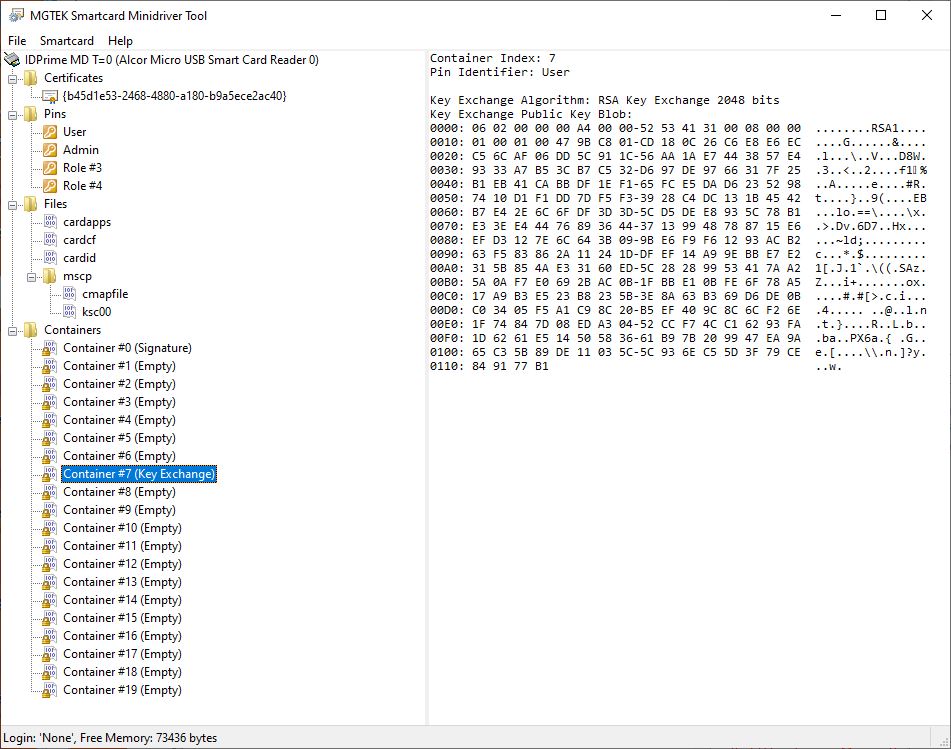|
|
(Delphi DLL) ScMinidriver - Get Public Keys from Smart Card Key Container
Demonstrates how to query a key container on a smart card (or USB token) to get the public part of the private keys that are present. A key container can hold two separate private keys -- one in the "signature" position, and the other in the "key exchange" position.
uses
Winapi.Windows, Winapi.Messages, System.SysUtils, System.Variants, System.Classes, Vcl.Graphics,
Vcl.Controls, Vcl.Forms, Vcl.Dialogs, Vcl.StdCtrls, ScMinidriver, PublicKey;
...
procedure TForm1.Button1Click(Sender: TObject);
var
scmd: HCkScMinidriver;
readerName: PWideChar;
success: Boolean;
pubkey_sig: HCkPublicKey;
pubkey_kex: HCkPublicKey;
begin
// This example requires the Chilkat API to have been previously unlocked.
// See Global Unlock Sample for sample code.
// Chilkat recommends the following free tool for interactively examining the contents of your smart card
// through the ScMinidriver interface: MGTEK Tool for Minidriver enabled Smart Cards
// Let's first look at our smart card..
// Here's the view of our Gemalto (Thales) IDPrime MD T=0 smart card in the MGTEK tool:
 scmd := CkScMinidriver_Create();
// First we need to acquire a context to the smart card in the reader where it is inserted.
// Reader names (smart card readers or USB tokens) can be discovered
// via List Readers or Find Smart Cards
readerName := 'Alcor Micro USB Smart Card Reader 0';
success := CkScMinidriver_AcquireContext(scmd,readerName);
if (success = False) then
begin
Memo1.Lines.Add(CkScMinidriver__lastErrorText(scmd));
Exit;
end;
// If successful, the name of the currently inserted smart card is available:
Memo1.Lines.Add('Card name: ' + CkScMinidriver__cardName(scmd));
// We likely shouldn't need to authenticate with the smart card (use a PIN) to simply get a public key,
// so we can skip the PIN authenticatin step..
// Let's get the key(s) present in Container #7.
// In our case (shown in the image above), there is a private key in the "key exchange" position, but no key in the "signature" position.
pubkey_sig := CkPublicKey_Create();
pubkey_kex := CkPublicKey_Create();
success := CkScMinidriver_GetContainerKeys(scmd,7,pubkey_sig,pubkey_kex);
if (success = False) then
begin
Memo1.Lines.Add(CkScMinidriver__lastErrorText(scmd));
Exit;
end;
if (CkPublicKey_getEmpty(pubkey_sig) = True) then
begin
Memo1.Lines.Add('No signature key is present.');
end
else
begin
Memo1.Lines.Add('Signature key:');
Memo1.Lines.Add(CkPublicKey__getPem(pubkey_sig,True));
end;
if (CkPublicKey_getEmpty(pubkey_kex) = True) then
begin
Memo1.Lines.Add('No Key Exchange key is present.');
end
else
begin
Memo1.Lines.Add('Key Exchange key:');
Memo1.Lines.Add(CkPublicKey__getPem(pubkey_kex,True));
end;
CkScMinidriver_DeleteContext(scmd);
Memo1.Lines.Add('Success.');
// Here's the output of the above sample code:
// Card name: IDPrime MD T=0
// No signature key is present.
// Key Exchange key:
// -----BEGIN RSA PUBLIC KEY-----
// MIIBCgKCAQEAsXeRhM55P13FbpNcXAMR3olbw2Wa6keZIHu5YTZYUBTlYWId+pNi
// wUz3zFIEo+0IfYR0H27ybIycQO+1IIzJofUFNMAL3tZps2OKPlsjuCPls6kXpXhv
// /gvhux8LrCtp4PcKWqJ6QVOZKChc7WAx40qFWzHi57ueqRTv3x0kESqGg/VjsqyT
// Evb55psJO2RsfhLT7+YVh3hImRM3RDaJdkTkPuOxeFyT6N7VXD09329sLuS3QkUb
// E9zEKDnz9X3d8dEQdJhSI9ba5fxl8R7fu8pB67ElfzFml96X1jLFtzy1pzOT5Fc4
// ROcaqlYckVzdBq9sxezm6MYmDBjNAcibRwIDAQAB
// -----END RSA PUBLIC KEY-----
CkScMinidriver_Dispose(scmd);
CkPublicKey_Dispose(pubkey_sig);
CkPublicKey_Dispose(pubkey_kex);
end;
scmd := CkScMinidriver_Create();
// First we need to acquire a context to the smart card in the reader where it is inserted.
// Reader names (smart card readers or USB tokens) can be discovered
// via List Readers or Find Smart Cards
readerName := 'Alcor Micro USB Smart Card Reader 0';
success := CkScMinidriver_AcquireContext(scmd,readerName);
if (success = False) then
begin
Memo1.Lines.Add(CkScMinidriver__lastErrorText(scmd));
Exit;
end;
// If successful, the name of the currently inserted smart card is available:
Memo1.Lines.Add('Card name: ' + CkScMinidriver__cardName(scmd));
// We likely shouldn't need to authenticate with the smart card (use a PIN) to simply get a public key,
// so we can skip the PIN authenticatin step..
// Let's get the key(s) present in Container #7.
// In our case (shown in the image above), there is a private key in the "key exchange" position, but no key in the "signature" position.
pubkey_sig := CkPublicKey_Create();
pubkey_kex := CkPublicKey_Create();
success := CkScMinidriver_GetContainerKeys(scmd,7,pubkey_sig,pubkey_kex);
if (success = False) then
begin
Memo1.Lines.Add(CkScMinidriver__lastErrorText(scmd));
Exit;
end;
if (CkPublicKey_getEmpty(pubkey_sig) = True) then
begin
Memo1.Lines.Add('No signature key is present.');
end
else
begin
Memo1.Lines.Add('Signature key:');
Memo1.Lines.Add(CkPublicKey__getPem(pubkey_sig,True));
end;
if (CkPublicKey_getEmpty(pubkey_kex) = True) then
begin
Memo1.Lines.Add('No Key Exchange key is present.');
end
else
begin
Memo1.Lines.Add('Key Exchange key:');
Memo1.Lines.Add(CkPublicKey__getPem(pubkey_kex,True));
end;
CkScMinidriver_DeleteContext(scmd);
Memo1.Lines.Add('Success.');
// Here's the output of the above sample code:
// Card name: IDPrime MD T=0
// No signature key is present.
// Key Exchange key:
// -----BEGIN RSA PUBLIC KEY-----
// MIIBCgKCAQEAsXeRhM55P13FbpNcXAMR3olbw2Wa6keZIHu5YTZYUBTlYWId+pNi
// wUz3zFIEo+0IfYR0H27ybIycQO+1IIzJofUFNMAL3tZps2OKPlsjuCPls6kXpXhv
// /gvhux8LrCtp4PcKWqJ6QVOZKChc7WAx40qFWzHi57ueqRTv3x0kESqGg/VjsqyT
// Evb55psJO2RsfhLT7+YVh3hImRM3RDaJdkTkPuOxeFyT6N7VXD09329sLuS3QkUb
// E9zEKDnz9X3d8dEQdJhSI9ba5fxl8R7fu8pB67ElfzFml96X1jLFtzy1pzOT5Fc4
// ROcaqlYckVzdBq9sxezm6MYmDBjNAcibRwIDAQAB
// -----END RSA PUBLIC KEY-----
CkScMinidriver_Dispose(scmd);
CkPublicKey_Dispose(pubkey_sig);
CkPublicKey_Dispose(pubkey_kex);
end;
|

